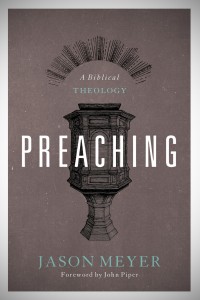 Jason Meyer, Piper’s successor at Bethlehem Baptist Church, just published an excellent book entitled Preaching: A Biblical Theology.
Jason Meyer, Piper’s successor at Bethlehem Baptist Church, just published an excellent book entitled Preaching: A Biblical Theology.
His thesis is that the ministry of the word, according to Scripture, is “stewarding and heralding God’s word in such a way that people encounter God through His word” (21). Three words in this thesis summarize the “what” of preaching: stewarding, heralding, encountering.
THE “WHAT” OF PREACHING
The first phase is the stewarding phase. This phase phase focuses on faithfully receiving God’s word. A steward is not a master, but a servant who is entrusted with something. God is the master and the word is His property, so a preacher receives something not his own.
The second phase is the heralding phase. This is when the preacher gives a human voice to the divine word, so the emphasis in this phase is on the tone of delivery. Preaching is not intended to be a conversational discussion that mimics a fireside chat. Rather, the preacher as a herald, makes his proclamation with a rousing “attention-getting noise” that cannot be ignored. Meyer is also wise to point out that a herald has no authority to tamper with the message he was given. He also has no right to assert his own opinions as if they represent the revealed will of the sender. A faithful herald proclaims the word as an ambassador representing his King.
The third phase is the encountering phase. In this phase the responsibility moves from the preacher to the people. Lord willing, the preacher has just heralded the word with faithfulness, now the congregation must respond to the word with faithfulness. Encountering God through His word is never only a positive encounter. Depending on the hearer, the encounter is either positive or negative. The word will always produce only two responses, a humbling or hardening of the heart. As Paul says in 2 Corinthians 4:3-4, encountering the word is either the smelling of life or death.
THE “HOW” OF PREACHING
Meyer shines brightly when talking about the way in which the word is to be preached. He says, “Stewarding and heralding must be carried out faithfully and fearlessly because the preacher has first encountered God through His word” (31). Meyer thus provides an adverb to each phase to explain “how” a preacher is to preach the word.
Steward the word “faithfully.” “It is required of stewards that they be found faithful,” says Paul in 1 Corinthians 4:1-2. Therefore, the very reality of preaching as stewardship demands faithfulness in preaching.
Herald the word “fearlessly.” The preacher carries the full weight of God’s authority into the pulpit. The sense of authority ought not create pride or self-exaltation, instead the preacher ought to tremble in his soul. Trembling before God means standing confidently before men, thus true fearlessness causes the preacher to speak up instead of holding back or being silent.
Encounter the word “reverently.” Preachers are should be fearless toward man, but reverent toward God. We should fear God alone because He alone has the power to destroy both the body and the soul (Matt. 10:28). “Therefore, all stewarding and heralding should take place in the context of the fear of the Lord” (34).
Meyer sums it all up by speaking of the dual vantage points of preaching,
These three categories are sequential from the vantage point of the hearer: the minister of the word must steward and then herald the word, and then the people should respond with reverent obedience. From the vantage point of the preacher, the order is different. The preacher knows that reverence must mark every stage of the ministry of the word. The minister must start with a reverent fear of God. This reverent fear engenders an aptitude to tremble at his word. (35)
Meyer has done all preachers a great service by so clearly giving three hooks on which to hang the “what” and “how” of preaching: 1) faithfully steward, 2) fearlessly herald, and 3) reverently encounter. Go grab the book, read, and then preach.

